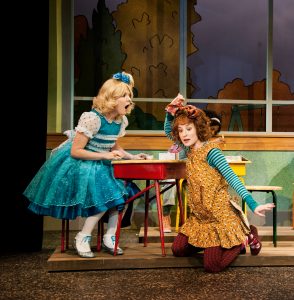
Kindergarten presents a big transition from being a baby to being a kid. In this way, it is similar to the ‘adolescence’ of childhood: our brains work in overdrive as we take in information from so many different directions. As adults, we can always grow from seeing things from a child’s perspective particularly when we are trying to impart a valuable lesson to one of our own.
In the play JUNIE B. JONES IS NOT A CROOK – now at Dallas Children’s Theater through Feb. 26 — Junie B. is smart, confident, and eager to apply her newfound knowledge. She doesn’t always think things through before she acts on them, but that’s part of being a kid that just finished being a preschooler. She’s a work in progress.
Who could blame her, though? Think about how we teach these young ones. In a kindergarten classroom, everything
has a label: Chair. Table. Desk. Door. The elements that aren’t labeled are feelings, concepts and ideas; the things we
can’t see. These things are difficult to communicate, especially when vocabulary is new and limited and emotions are
vast and untamed. This is when an eager, outspoken kid, like Junie B. Jones for example, reaches for her newly-acquired vocabulary words that just don’t always fit and may ultimately create misunderstandings and misperceptions. Seeing Junie B.’s antics on stage allows us as adults to clearly appreciate the importance of giving a child the freedom to get it right before correcting every move. It also helps grownups appreciate the benefit of being that listening ear and supportive hand to guide the little one on their journey. Through live performances, Dallas Children’s Theater helps start these conversations.
Seeing Junie B.’s antics on stage allows us as adults to clearly appreciate the importance of giving a child the freedom to get it right before correcting every move. It also helps grownups appreciate the benefit of being that listening ear and supportive hand to guide the little one on their journey. Through live performances, Dallas Children’s Theater helps start these conversations.
Junie B. can also teach us all the virtues of appreciating difference and being more accepting of others. She, herself,
doesn’t mind being different. She teaches us to surround ourselves with colorful, multifaceted friends who are as
different as we are.
Even at her young age, Junie B.’s group of friends represents one big melting pot. Her interaction with her friends is a wonderful lesson in acceptance. She celebrates each friend’s uniqueness without ever belittling them. We can all take an extra moment to offer the benefit of the doubt with regard to why something was said or done before we react. One never knows what someone else’s life circumstances might be. The message is that you don’t always get a second chance to be kind to someone.
Sometimes Junie B. comes across as sassy, and sometimes her mouth works much faster than her brain. These
moments provide chances to give her the benefit, while being mindful of how young children learn vocabulary. Junie B. Jones isn’t a crook; she’s a young girl on the road to discovering the recipe that is her life. Parents and onlookers must remember to give children the freedom they need to ultimately get it right.
From the shows that go on our stages, to the resources provided to support families, DCT wants to do its part to help
parents and children value and celebrate the unique and precious differences in each other.
JUNIE B. JONES IS NOT A CROOK runs now through February 26. Visit dct.org for show times and ticket pricing.
Courtesy DCT




